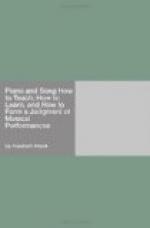How far what I have here said relates to our modern errors in singing, and how far it may be applied to them, I leave to the intelligence of my readers and to my explanations in subsequent chapters.
To return to my theme: I have still one word on this subject for rational players. Even they use the soft pedal too much and too often, and at unsuitable places; for instance, in the midst of a piece, without any preparatory pause; in melodies which require to be lightly executed; or in rapid passages which are to be played piano. This is especially to be noticed with players who are obliged to use instruments of a powerful tone and stiff, heavy action, on which it is difficult to insure a delicate shading in piano and forte. For this reason, a sensible and experienced teacher, whose sole aim is the true and the beautiful, should make the attainment of an elastic touch and well-grounded style of playing an indispensable requirement. I prefer that the soft pedal should be used but seldom, and, if the pedal which raises the dampers is used at the same time, it must be only with the greatest nicety. The soft pedal may be used in an echo; but should be preceded by a slight pause, and then should be employed throughout the period, because the ear must accustom itself gradually to this tender, maidenly, sentimental tone. There must again be a slight pause before the transition to the usual more masculine tone, with the three strings. The soft pedal is, moreover, most effective in slow movements with full chords, which allow time to bring out the singing tone, in which consists the advantage of the stroke of the hammers on two strings alone.
CHAPTER VII.
A MUSICAL TEA-PARTY AT THE HOUSE OF JOHN SPRIGGINS.
I once more introduce my readers to the scenes of my active, musical life, with an invitation to accompany me to a musical tea-party. My object is, in a short and entertaining manner, to remove very common prejudices; to correct mistaken ideas; to reprove the followers of mere routine; to oppose to malicious cavilling the sound opinions of an experienced teacher; to scourge dogmatic narrow-mindedness; and in this way to advance my method of instruction.
* * * * *
DRAMATIS PERSONAE.
JOHN SPRIGGINS (jovial and narrow-minded, a member
of
an ancient musical family).
MRS. SPRIGGINS (irritable, envious, and malicious).
LIZZIE, their daughter, 13, years old (lively and
pert).
SHEPARD, her piano-teacher (very laborious).
DOMINIE, a piano-master (very stern).
EMMA, his daughter, a pianist (silent and musical).
MRS. SPRIGGINS (to Dominie). So this is your daughter who is to give a concert to-morrow? She is said to have less talent than your eldest daughter. With her, they say, nothing requires any labor.




